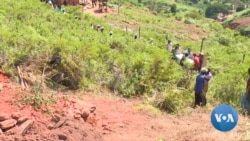The United Nations says the combined death toll in southern African nations affected by Cyclone Idai has exceeded 700.
More than 400 of the deaths have occurred in Mozambique were aid groups are struggling to assist tens of thousands of people of the ground.
Mozambique Minister of Land and Environment Celso Correia said the situation "is still critical, but it's getting better." He said some 1,500 people were in need of rescue from rooftops and trees and about 89,000 people had packed into displacement camps.
Zimbabwe and Malawi are also struggling to deal with the aftermath of the cyclone.
Aid workers said that number of dead in the three countries will certainly rise as flood waters continue to recede. Some 1.7 million people were affected by the storm, one of the most powerful to strike the region in decades.
As storm victims labored to salvage personal possessions they were able to find, many residents in the affected areas worried about their future and shortages of essentials such as food, water and medicine.
International aid efforts are coordinated by the World Food Program, or WFP. The agency’s southern Africa director, Lola Castro, told VOA on Friday relief groups are confronted with a “humongous logistics challenge” to help victims who are “extremely stressed.”
WATCH: Cyclone Idai Victims Appeal to Zimbabwean Government for Fast Relief
Castro said problems were compounded by the fact that the stricken areas are located near the mouths of rivers. "Remember, these are deltas … and all these deltas are between salt- and freshwater." She said the tidal waves created by Idai might have salinized area waters, adding, "People are drinking this."
Hundreds of thousands of people have been displaced, most of whom are still in need of shelter. The WHO has warned that squalid conditions could help lead to the spread of infectious diseases.
The International Federation of the Red Cross and Red Crescent Societies said Friday that cases of cholera had been reported in Beira, Mozambique's fourth-largest city.
U.N. Secretary-General Antonio Guterres said Friday that the U.N. and its humanitarian partners were "scaling up the response with the initial funding from generous donors." He said the U.N. had already released $20 million but added, "Far greater international support is needed."
The WFP's Castro said a "huge" humanitarian response was just the beginning. "The [Mozambique] government is going to need a lot of support on this, and the international community will have to look into a very long-term" humanitarian relief campaign, she said.







